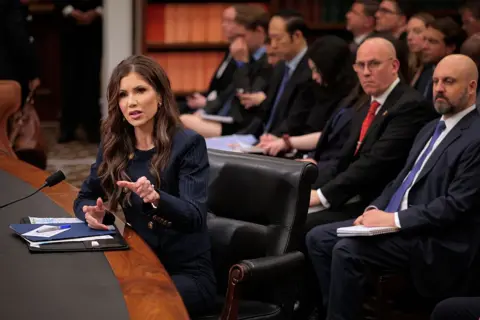Homeland Security says 64 people 'self-deported' on US flight
 Getty Images
Getty ImagesThe US Department of Homeland Security has said 64 people took a government-funded flight to their home countries as part of a new programme encouraging undocumented immigrants to "self-deport."
The initiative, dubbed "Project Homecoming", is part of President Donald Trump's sweeping crackdown on illegal immigration, which has also involved detaining hundreds of migrants in a Salvadoran mega-prison.
Immigrants can leave the country on their own, in exchange for free travel and a $1,000 (£749) stipend, and avoid detention or other punishments for being in the US illegally.
The first government-chartered flight took off from Texas and travelled to Honduras and Colombia.
Homeland Security characterised the trip as a "voluntarily charter flight," and not an operation of the US Immigrations and Customs Enforcement agency.
Of the 64 individuals on the flight, 38 returned to Honduras and 26 people went to Colombia, the department said.
In March, the Trump administration announced that people in the US illegally could utilise the border patrol app, CPB Home, to depart the country voluntarily. Since then, it has sent some people home on commercial flights.
Officials have described Project Homecoming as a smoother alternative to forcible deportations.
"If you are here illegally, use the CBP Home App to take control of your departure and receive financial support to return home," Homeland Security Secretary Kristi Noem said in a statement.
"If you don't, you will be subjected to fines, arrest, deportation and will never be allowed to return," Noem said.
Trump's other deportation initiatives have faced significant pushback from immigrants rights groups and numerous lawsuits.
Some of the legal battles have reached the US Supreme Court, with a mix of wins and losses for Trump.
On Saturday, the justices barred the administration from continuing to use the 18th century law known as the Alien Enemies Act to continue to deport Venezuelan migrants it has accused of gang membership.
Then on Monday, the court allowed the Trump administration to end protections against deportation for 350,000 Venezuelans who had been given Temporary Protected Status, which allows migrants to live and work legally in the US if their home country is deemed unsafe.
One of the highest-profile battles involves the deportation of a man living in Maryland, Kilmar Abrego-Garcia, to El Salvador over allegations he was a violent gang member.
A federal judge ordered the administration to facilitate his return, and that order was upheld by the US Supreme Court. However, Mr Abrego-Garcia remains in El Salvador, with the government arguing in court that it cannot compel the other country to take action, even though Trump has said in an interview that he "could" return Mr Abrego-Garica.
